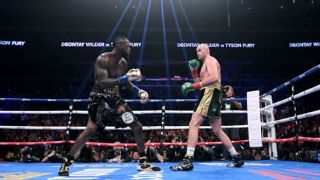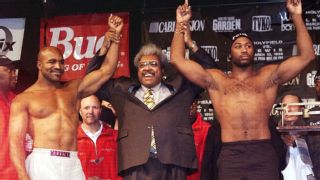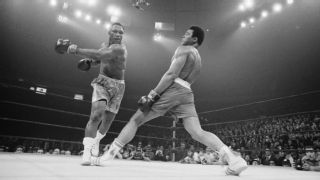|
Deontay Wilder's eighth title defence against Tyson Fury left a lot to debate about the decision -- and also whether the rematch will be as good as Saturday's controversial split points draw. Rematches are borne out of the desire to settle uncertainty and arguments, but also to see boxers fight again after an entertaining first encounter, just as it was at the Staples Center in Los Angeles at the weekend. Wilder clung on to his WBC world heavyweight title after Fury, having outboxed the American for nearly all the fight, was laid out flat on his back in the last round by a right hand and left hook. Fury, who was also floored in the ninth round, only just beat the count and insists he should have still got the decision. Now we want to see it again and, due to a rematch clause in the fight contract, chances are we will after one judge had it 114-112 to Fury, another 114-112 to Wilder while the third, Fury's fellow Briton Phil Edwards, saw it a draw. Some of boxing's biggest ever fights have been world heavyweight title rematches and both Wilder and Fury will earn more from their sequel with more people tuning in on pay-per-view television around the world. Wilder-Fury II will be bigger than last's weekend's clash, just as most rematches are, but not many live up to expectations and go down in history for the right reasons.  The fight will be the biggest world heavyweight title rematch since Fury's fellow Briton Lennox Lewis won back his IBF and WBC crowns with a vicious fourth round finish of Hasim Rahman in Las Vegas in November 2001. Earlier that year, the division's No. 1 was caught flush by little-known Rahman after dropping his hands in round five in one of boxing's biggest upsets. Lewis also avenged his only other defeat when American Oliver McCall crumbled in five rounds in February 1997. The rematch ended with the crowd in Vegas booing after one of the strangest world heavyweight title fights in history. McCall, who knocked out Lewis in two rounds in 1994, appeared to have a nervous breakdown in the ring, was reluctant to fight and even crying. Months after the fight he was admitted to a mental hospital after problems with crack cocaine. But the rematch that holds real resonance with Wilder-Fury is Holyfield-Lewis. In another US-UK clash, Lewis was widely thought to have been denied a deserved points decision in a clash to become undisputed world heavyweight champion in New York in March 1999. Lewis outboxed and out-jabbed Holyfield, who could not land his punches just as Wilder struggled. Yet judges scored it a draw (with British judge Larry O'Connell scoring it 115-115 in another parallel with Wilder-Fury), and Lewis said he was "robbed". Lewis landed 348 of 613 punches, while Holyfield landed just 130 of 385, and the decision was slammed around the world. In a rematch at the end of 1999, this time in Las Vegas, Lewis dominated again and the judges saw scored it unanimously in his favour. Lewis was a comfortable winner in a fight that did not live up to everyone's hopes, with some early rounds booed for a lack of action. Other classic world heavyweight title rematches include Muhammad Ali-Joe Frazier in October 1975 in the 'Thriller in Manilla', four years after Frazier had beaten his fellow American for the world title. In one of the most gruelling battles in fight history and with both nearing exhaustion, Ali let fly with a volley of punches in the 14th round. It was too much for Frazier's trainer, Eddie Futch, who told his boxer: "Sit down, son. It's all over."  That rematch was one of the most epic encounters in boxing history, and Ali was involved in other significant returns against Sonny Liston and Leon Spinks. Ali defeated Spinks, who out-pointed earlier in 1978, at the tail end of his career in front of an estimated television audience of 90 million, but it was a soporific affair full of clenches and holding. In 1965, a year after Ali (then known as Cassius Clay) upset the odds to force Liston to quit on his stool in the sixth round, there were calls of foul play, and mob involvement, after Liston was floored and counted out by a "phantom punch" in the first round. There have been other controversial rematches. In Chicago, September 1927, a year after their first bout, former champion Jack Dempsey appeared to have avenged a points defeat by flooring Tunney in the seventh round. But the referee refused to start the count until Dempsey had retreated to a neutral corner. Tunney got up before the delayed count reached 10 and, with his head cleared, went on to win on points and retain the world heavyweight title in the 'Battle of the Long Count'. Seventy years later, Mike Tyson and Holyfield's rematch became known as 'The Bite' -- one of boxing's most notorious fights -- after Tyson was disqualified in the third round for twice biting the champion's ears. Holyfield, who stopped Tyson in the 11th round of their first fight, was left with a chunk out of his ear. Holyfield beat Riddick Bowe in a dramatic rematch in 1993 -- but the fight is best remembered for a hang-glider crashing into the ring during the fight. When it comes to heavyweight title rematches, none was bigger than Joe Louis' quick destruction of German Max Schmeling in 1938, with pre-fight hype dominated by propaganda surrounding the imminent Second World War, which attracted global interest.  And one of the earliest big heavyweight title rematches featured a Briton. Bob Fitzsimmons, Britain's first world champion in 1897, lost the title James J Jeffries by knockout in 1899 and, in the rematch three years later, outboxed the American before a sudden end. Fitzsimmons, 39, briefly paused in dishing out punishment to talk to Jeffries, who seized his chance to land a knock out in the eighth round in San Francisco. While Lewis -- Britain's next world champion after Fitzsimmons nearly 100 years later -- may have enjoyed outstanding success on American soil (14 world title wins in the U.S.), Fury will want to avoid a fate similar to fellow Briton Frank Bruno's when he met Tyson in a 1996 rematch. Paralysed by fear, Bruno was wiped out in three rounds after shaking the American early in their 1989 encounter, before being stopped in the fifth. But Fury (27-0-1, 19 KOs), 30, of Manchester, is unlikely to be ever overcome by a lack of confidence and will also feel he will not have to change much, having outboxed Wilder for nearly all of the 12 rounds. However, improving his conditioning to remain sharp in the later rounds, and avoid Wilder's big swings, would help. Fury, who outpointed Wladimir Klitschko for the other three versions of the world title three years ago before a 31-month exile, was outstanding considering it was his third comeback fight in six months after being 28 stones and suffering from mental health problems, as well as drug and alcohol addiction, following the Klitschko win. Wilder (40-0-1, 39 KOs), 33, of Alabama, was out-punched and will have to improve his own stamina. The emphasis will be on the American to improve after escaping Los Angeles with the WBC belt still in his possession. And he has shown he can improve. The last rematch Wilder had in 2017, his opponent did not survive the first round (Bermane Stiverne is also the only man to take Wilder the 12-round distance, other than Fury). Fury also produced better displays when he met Dereck Chisora and John McDermott in rematches earlier in his career. Can both Wilder and Fury improve again to feature in an era-defining rematch better than Saturday's encounter which goes down in history alongside the likes of other significant sequels like Tunney-Dempsey, Louis-Schmeling, Ali-Frazier and Lewis-Holyfield?
|
